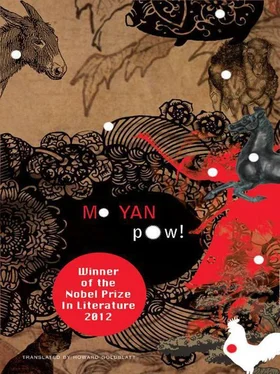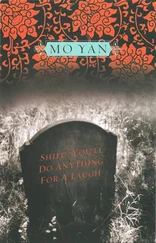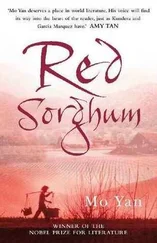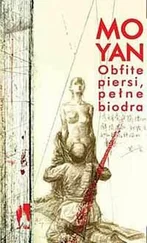‘Go where?’ I asked. They'd really piqued my interest. ‘I'm ready.’
‘Shut up,’ Mother barked angrily, then turned back to Father. ‘I know how important saving face is to you, but a New Year's visit isn't going to demean you. What's wrong with villagers paying a call on their village head?’
‘People will talk,’ Father said, digging in his heels. ‘I don't want people saying that I'm kissing Lao Lan's arse!’
‘You call New Year's greetings arse-kissing?’ Mother was incredulous. ‘Lao Lan gave us electricity, he gave us a New Year's gift, he gave the children red envelopes—you wouldn't call that arse-kissing, would you?’
‘That's different…’
‘All those promises you made to me, they meant nothing…’ Mother sat on the bench. The colour left her cheeks and they grew wet with tears. ‘Apparently you have no intention of staying with us…’
‘Lao Lan's a big shot!’ Despite my general lack of sympathy for my mother, I hated to watch her cry. ‘Dieh,’ I said, ‘I'm happy to go. Lao Lan's an interesting guy, worth being friends with.’
‘He thinks Lao Lan's beneath him,’ Mother said. ‘He only wants to be friends with arseholes like Yao Qi.’
‘Yao Qi's a bad man, Dieh,’ I said. ‘He called you names when you were away.’
‘Xiaotong, stay out of adults’ affairs,’ Father said gently.
‘I think Xiaotong's got better sense than you.’ Now Mother was angry. ‘After you left, Lao Lan was the only one who treated us well. Yao Qi and the others got a kick out of watching bad things happen to us. It's times like that when you can tell who's good and who's bad.’
‘I'm going, too, Dieh,’ Jiaojiao said.
Father heaved a sigh. ‘All right, have it your way. I'll go.’
Mother went to the wardrobe and took out a blue wool tunic.
‘Wear this,’ she said in a tone that permitted no objection.
Father decided to say nothing. Instead, he dutifully took off his greasy, tattered jacket and put on the tunic. Mother tried to button it up for him; he pushed her hand away. But he didn't resist when she went round and straightened the back.
As a family we walked out of the house and onto Hanlin Avenue. The streetlights that had been installed shortly before New Year's were already lit. Children were out playing chase; a youngster was reading a book under one of the lights; some men were loitering under another, arms crossed, engaged in idle talk. Four young men were showing off their riding skills on brand new motorbikes, revving them up to make as much noise as possible. There was the occasional burst of firecrackers in front of houses that sported a pair of red lanterns in the doorway and a carpet of red confetti on the ground. ‘All those firecrackers,’ Father had muttered on New Year's Eve, ‘you'd think it was the beginning of World War III.’
‘More firecrackers means more money,’ Mother said, ‘and shows how effective Lao Lan's leadership has been.’
That's exactly how we felt as we walked down Hanlin Avenue. Within the confines of a hundred square li , Slaughterhouse was the only village in the area in which the roads had been paved and streetlights installed. Nearly every family lived in multistoreyed, tile-roofed houses; many even had modern interiors.
Hand in hand, our little family of four proceeded down Hanlin Avenue. It was the first time we'd appeared in public as a family. It was also the last. But I felt both proud and contented. Jiaojiao walked along happily. Father seemed less than natural. Mother was calm and unperturbed. Passers-by greeted us—Father barely mumbled a response but Mother heartily returned their greetings. When we turned into Lan Clan Lane, which led to the Hanlin Bridge, Father grew increasingly uneasy. The lane also boasted a dozen or so streetlights, which shone on the black gates and the bright red couplets pasted on them. Coloured lights on the distant Hanlin Bridge put the arch in relief. The largest village compounds were on the other side of the river, lit up holiday-bright.
I knew what was bothering Father—the bright lights. If he'd had his way, the lane would have been pitch black to hide us from view. He'd have been happiest if we'd delivered our New Year's greetings in complete darkness, hidden from public view. I also knew that Mother's feelings were the exact opposite. She wanted people to bear witness to the fact that we were bringing New Year's greetings to Lao Lan, that close bonds of friendship had developed between us, which in turn was a sign that her husband, my father, had turned over a new leaf, transforming himself from a disreputable vagrant into a respectable family man. I knew that the village was alive with talk about us, talk that centred on the virtues of my mother. ‘Yang Yuzhen,’ they said, ‘is quite a woman. She can bear hardships, she has endurance, patience and foresight, and she's eminently sensible, all in all not one to be taken lightly. As I well knew,’ they went so far as to say, ‘Just watch, it won't be long before that family flourishes.’
There was nothing out of the ordinary about the gate to Lao Lan's house; if anything, it was shabbier than his neighbours’. In fact, it did poorly in comparison even with ours. We stood on the steps and banged the knocker against the gate and immediately heard the frantic barks and threatening growls of the wolfhounds on the other side.
Jiaojiao pressed up against me.
‘Don't be scared, Jiaojiao,’ I comforted her. ‘Their dogs don't bite.’
Mother knocked again, but drew no response, except from the dogs.
‘Let's go,’ Father urged. ‘They must be out.’
‘If so, there has to be someone to watch the place,’ Mother said.
She knocked again, neither too hard nor too soft. As if she were saying: I won't stop until you come out to see who's here.
Her efforts were finally rewarded. We heard the sound of a door opening, followed by a girl's crisp command to the dogs: ‘Shut up!’ Next, the sound of footfalls approaching the gate. Then, at last, a question—impatiently delivered—from the other side: ‘Who is it?’
‘It's us,’ Mother replied. ‘Is that Tiangua? I'm Yang Yuzhen, Luo Xiaotong's mother. We're here to wish you a happy New Year.’
‘Yang Yuzhen?’ The name was not familiar to the girl.
Mother nudged me to say something. Tiangua, Lao Lan's only child, had grown quite a bit, and her mother could have had a second child if she'd wanted. She hadn't. I dimly recalled someone saying that Lao Lan's wife was ill and had not been out of the house in years. I knew Tiangua, a girl with dull brown hair and two lines of snot above her mouth. She was a bigger slob than me, and couldn't begin to compare with my sister. I didn't like her one bit. So why did Mother want me to say something? Was I supposed to believe that my voice carried more weight than hers?
‘Tiangua,’ I said finally, ‘open up. It's me, Luo Xiaotong.’
Tiangua stuck her head out through a small opening in the gate, and the first thing I noticed was that there was no snot above her mouth and that she was wearing a nice jacket. Then I saw that her hair wasn't as dull brown as I remembered, and that it was neatly combed. In a word, she was a better-looking girl than I recalled. She sized me up with a squint and a strange look, and those slitted eyes and light hair reminded me of the foxes I'd seen recently. Again the foxes. I'm sorry, Wise Monk, I don't want to talk about them but they keep coming back to me. Foxes, which had been raised as rare animals at first but in such large numbers that they had to be wholesaled at a deep discount to Slaughterhouse Village, where they were slaughtered and their meat mixed with dog to be sold. Our butchers didn't forget to pump the slaughtered foxes full of water, though the process was more difficult than with cows or pigs, since they were so much trickier, so much harder to work on. That's where my thoughts roamed when I heard Tiangua's say ‘My dieh isn't home.’
Читать дальше












